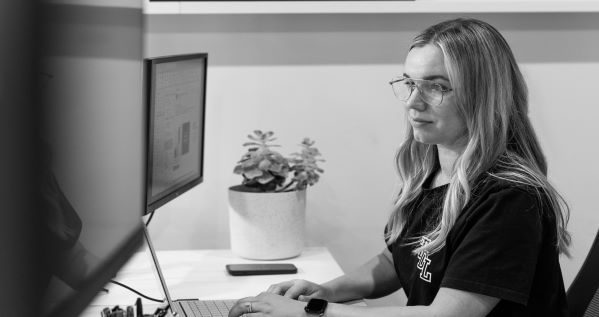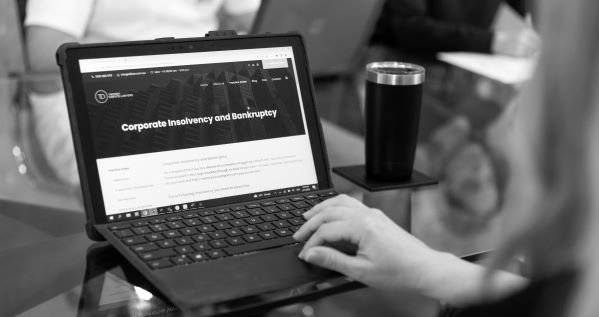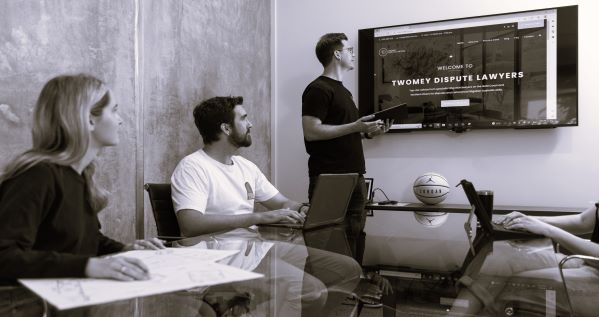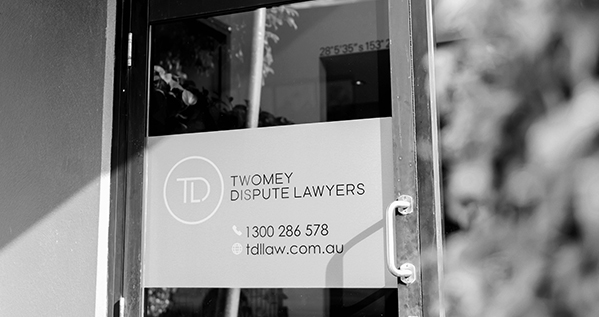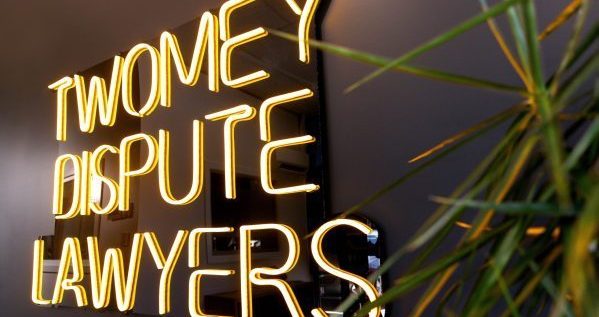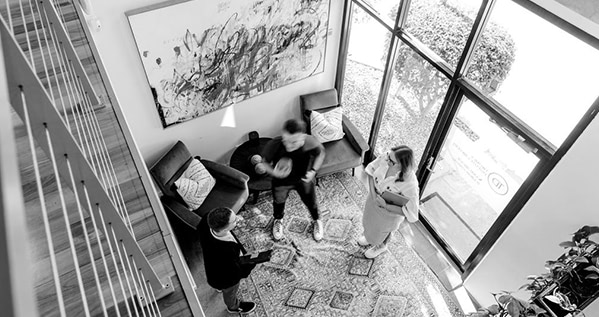Q: Tell us a little more about your role and how you came to be an Owner and Director of Twomey Dispute Lawyers.
I’ve been a litigation lawyer, or professional problem solver, for 14 years. I have recently become an owner and director of Twomey Dispute Lawyers after a whirlwind 2 and a half years with the firm.
My childhood-self wouldn’t recognise me now. If you had asked me 15 years ago if I would ever own a business, I would have categorically said no. All I wanted to do was be a lawyer, a technician, and be really good at that. I always thought that was a high achievement, but probably my ceiling. The thought of running a practice, owning a business and being the leader of a team was too daunting to even consider.
Building confidence through small achievements and coming out the other side of difficult patches, has led me to new depths, take more risks and seize opportunities that I never expected I would.
At Twomey Dispute Lawyers, we have 27 staff members. I’m really proud that 7 are parents, 17 are female, and a number of those females are in leadership positions.
Q: Why is the discussion around gender equality so important to you?
Gender equality for me means people not acting based on presumptions and gender stereotypes, but rather, on merit. Unfortunately, the statistics indicate it will be generations before there will be true gender equality in a lot of industries. To achieve it, we have to talk about the issue now and bring awareness to the social norms which stifle progression towards true gender equality. Without acknowledging it exists, and challenging those perceptions of what male and female roles are, the more entrenched those become.
Q: Let’s talk about work-life balance, how do you manage yours, and what’s most important?
I can’t talk about my role, work-life balance, and the subject of challenging the perceptions of the male and female roles, without acknowledging my family dynamic. I have a husband and two children, aged 3 and 8. My husband is our children’s primary carer, and works part-time to do the drop-offs and pick-ups etc.
When it came time to decide what we were going to do when our eldest started school, there was no difficulty in making the call that my husband would go part-time instead of me. I appreciate that not everyone has that luxury, and being a working parent is extremely hard (it is the true definition of full-time work). I think it’s worth mentioning though, because so many people say, “I don’t know how you do it”, “You make it look so easy”. Truth is, I’m not doing it. I’m not making it look easy. It’s a collective effort, one which I hope people realise is not possible without someone else making a compromise, irrespective of traditional gender roles.
What I think is important to acknowledge also is, needs change, and priorities change. You may feel like you are in snakes and ladders, but that doesn’t mean you have to choose between your personal needs and priorities and your career.
Q: What do you think companies underestimate when it comes to supporting women in the workplace?
I think it’s important that everyone in the organisation is given equal opportunities, regardless of gender or circumstances. For example, you can’t presume that because someone is a mother that they won’t be able to do work related travel or handle the extra responsibilities that come with a promotion. The same presumption wouldn’t be made about a male employee who happened to also be a father. The person who is overlooked purely because of their gender or circumstances, will not feel valued or supported, and if you are not going to value and support your team players, they’ll go looking for someone who will.
One thing that comes up a lot in law, is having clients who only want to deal with a male lawyer. Having an employer which refuses to accede to those demands sends a strong message that you have their back and you will stand up for them even if it means losing a client.
Q: Do you have an example of a time when a male has been unintentionally gender-biased?
In law, I find this happens a lot in conferences and mediations, where there are multiple people in the room, all with different roles to play. There’s usually an assumption made by someone that the female in the room is there in a supporting role – the person you ask to do something administrative to facilitate the men talking. Not worthy of a handshake.
There are obviously worse examples when you start looking at gender bias that is deliberate, which is still rife. They are usually disguised as jokes with a strong undercurrent of sexism, but others are just straight up sexism. One male colleague told me that he thought he should have the conversation with the lawyer on the other side, because “it’s the kind of discussion that needs to be man to man, to cut all the bull-shit.” In truth, he didn’t know the lawyer on the other side any better than me, he didn’t know the case any better than me, and he wasn’t capable of delivering the message any better than me. It was nonsense.
It comes from clients as well. One client told me I had balls. This was meant to be a compliment, I get it, but why did he need to describe my skills by reference to a male organ?
It’s not just males though. Women in leadership roles have a long way to go as well. I personally have to check myself every time I go to write “His Honour”, assuming that the Judge I am referring to is a male. We also have to ensure we don’t fall into the trap of apologising for making a request, or starting a question with “This is probably a stupid question, but…”.
Q: How can we encourage our male colleagues to do better to support women in the industry?
I always assumed that younger male colleagues were aware of what women were subjected to, and were just indifferent about it. I have come to realise that most often the problem lies in a complete lack of awareness of the behaviour, and that in itself is perpetuating gender bias. I think the best thing for moving towards gender equality is education and discussion. I do strongly believe the conversation needs to involve men. We can’t talk about it amongst only women and expect men to do anything differently.
Q. What’s the best piece of advice you’ve been given and what advice would you give to younger women starting out in their career today?
The advice I was given growing up that stands out for me, was around aspiring to aim high and push boundaries. If I thought something was out of reach, the question was always put to me, “Why not?”, “Why can’t you?” “The world is your oyster.” What might have been cliche comments from my parents, impacted my outlook. So I think the best support, for me, was getting into that mindset at a young age.
In terms of navigating gender bias in the workplace, I feel like I’ve had to figure this out on my own through experiences and realising what doesn’t sit right with me. Calling out certain behaviour is hard when you’re paving your way as a junior lawyer and finding your feet in the workplace. Sometimes impossible, particularly if you’re the only one that witnessed it or was subjected to it. But it’s important to reflect and think, how would I handle that situation differently if it happened again? You have to do that to find your voice.
When I was a newly admitted lawyer, about 22 years’ old, very timid, I was standing in the office of the supervising partner while he was settling my work. It was taking forever and without even realising it, the fidget in me started rocking back and forth on the heel of my shoe. Without taking his eyes of the paper, the partner said, “You’ll make a great mother one day”. That was a random comment. I was confused. “What?” I said. “You’ve got a good hip swish” he replied. “Hip swish?” He said, “Yeah. Mother’s need that to settle their babies. That’ll be you soon. That’s what young female lawyers do. They practice for a few years and then they settle down, have babies.” He said that in a very matter-of-fact way, like that was the short-lived career path of a female lawyer. I smiled politely and continued waiting, completely frozen still this time.
That never sat well with me. I felt strongly about it at the time but it wouldn’t be until years later that I would find my voice and challenge comments like that.
Nothing he said was meant to be malicious. Quite the opposite. He probably thought it was a compliment. But it was him expressing his ingrained gender bias in a very literal way, one which said enough times, influences the next generation, and the next, and so on. Looking around at that time, I saw no female law partners and no female Judges. I could have easily believed it.
As a young lawyer today, regardless of gender, educate yourself and open up the conversation. Start with one person. Build confidence through talking about it with that person and getting a new perspective.

